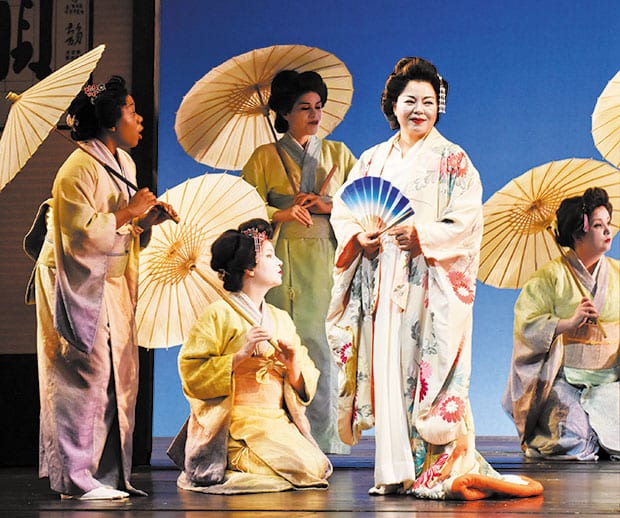How do you reconcile a cliché-filled, anti-progressive plot with one of the most famous operas of all time?
Despite its enduring popularity in the contemporary canon, Madame Butterfly has never been one of my favorite operas. In fact, I tend to dislike it with a fair degree of brio. Giacomo Puccini composed some lovely music that endures and even inspires (listen carefully, and you can detect passages that hint at Les Miserables, as well as some that crib from his own La Boheme). But too often — and especially here — those passages are weighed down with cumbersome libretti that seem to stretch out interminably.
That’s definitely true of Butterfly.
The plot is simple, but also reprehensible. Pinkerton (tenor Gianluca Terranova), an American sailor station in Nagasaki in 1904, agrees to “marry” a local girl, a 15-year-old geisha named Cio-Cio San (soprano Hui He), with full knowledge that while the marriage is technically legal, he can divorce her at any time without consequence by simply abandoning her. His friend, the U.S. consul Sharpless (baritone Lucas Meachem), warns him not to play with an ingénue’s emotions, which, of course, he ignores. And because this is opera, she steadfastly refuses to believe what a scoundrel Pinkerton is even after he dumps her and the infant child she bore in his absence, moves back to America and finds a pretty, white, blonde wife. The Pinkertons take the child back to the U.S. Cio-Cio San kills herself in sacrifice.
This has never seemed like grand, heightened emotions but the story of a dick who gets away with ruining someone’s life without suffering any consequences. And perhaps worst of all, it sets up the “shy lotus blossom subservient to men of the West” cliché that has plagued cultural identity politics for generations.
Usually with opera, it’s easy to compartmentalize the actions onstage from our own lives — the pieces were written centuries ago, or are set in mythic, far-away lands or highly fanciful settings. But Butterfly is so modern, so familiar, its plot always leaves a bitter after-taste, like seeing actors perform minstrel acts wearing blackface. A teenager seduced by a sleazy sailor (who never gets a real comeuppance) and ruined emotionally, financially, fatally? You feel complicit in its outdated attitudes and casual colonialist superiority. And it takes nearly three hours to get there.
Indeed, the pacing of Butterfly has perpetually irked me; there’s more pomp in reading a simple letter than most of us would commit to writing an entire novel, and long, gooey romantic passages neither advance the plot nor dazzle us with spectacle. The love ballad that ends Act 1 goes on an on long after the lovers have run out of words to sing. The interlude between scenes in Act 2 lasts a full five minutes, and when the curtain finally rises again, the setting hasn’t changed an iota.
You endure all this, of course, for masterful performances from singers who know how to milk Puccini’s lush melodies for all they’re worth. But while Hui He’s voice is powerful and pitch-perfect, her phrasings are unexpectedly anti-climactic (notably her showpiece aria, the legendary “Un bel di,” seems abbreviated in the last note). Terranova’s performance is ham-fisted and callow. Only Meachem’s Sharpless carries the necessary dramatic weight and also provides the few moments of levity.
Madame Butterfly is an opera where you are either already a fan or you struggle to become one. I’m the latter. And the struggle is real… and not one that ends victoriously.
— Arnold Wayne Jones
This article appeared in the Dallas Voice print edition MARCH 17, 2017.
••••••••••••••••••••••••••••••••••••••••••••••••••••••••••••••••••••••
GET SCREWED
Benjamin Britten makes a return to the Dallas Opera after 20 years with the company debut of ‘The Turn of the Screw’
 Madame Butterfly is one of the world’s most-performed operas; the same can’t be said of Benjamin Britten’s The Turn of the Screw, though the Dallas Opera’s next production sets out to remedy that.
Madame Butterfly is one of the world’s most-performed operas; the same can’t be said of Benjamin Britten’s The Turn of the Screw, though the Dallas Opera’s next production sets out to remedy that.
Britten is perhaps the most famous British composer of opera, though still less widely-known than his Italian, French and Russian counterparts. The DO has staged only four productions of his works in its history (Peter Grimes, The Rape of Lucretia, Billy Budd and now this) — that’s about one-third of the number of productions of Butterfly alone. And Turn of the Screw — based on Henry James’ novella, one of the iconic psychological ghost stories in literature — is making its company debut.
A chamber opera (only six actors are required), it tells the story of a young governess (soprano Emma Bell) hired by the absent guardian of two children — nephew Miles (Oliver Nathanielsz) and niece Flora (Ashley Emerson) — to live in their remote house and look over her mysterious charges. The governess grows uneasy with the children, hearing stories about their behavior she can’t believe, but unable to ask their uncle for advice. Then she begins seeing a shadowy figure on the grounds … someone whom she’s told is dead. Can she trust what she sees? And what is the power that Bly House has over her psychological well-being?
Britten culls his musical inspiration from both traditional nursery rhymes as well as his own modernist 12-tone themes that inject dissonance and surprise that crawls under your skin. But don’t worry if that’s not your style — next up from the DO will be Bellini’s Norma, one of the great bel canto operas of all time.
— Arnold Wayne Jones
Winspear Opera House, 2403 Flora St.
Performances March 17, 22 and 25 at
7:30 p.m., March 19 matinee at 2 p.m.
DallasOpera.org.
This article appeared in the Dallas Voice print edition MARCH 17, 2017.


